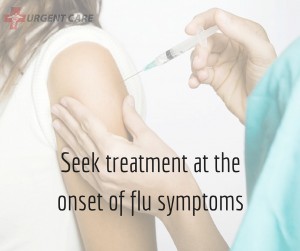 Influenza. For some people, it’s a rough cold. For others, it can be life threatening. The flu is a virus that hits you with full strength very quickly, as opposed to a cold – which can take a few days to reach its apex. It’s very important to be tested in order to determine which one you have. Once diagnosed, proper flu treatment can reduce the severity and duration of the illness. It’s important to treat it immediately. If left untreated, the antiviral flu drugs aren’t as effective.
Influenza. For some people, it’s a rough cold. For others, it can be life threatening. The flu is a virus that hits you with full strength very quickly, as opposed to a cold – which can take a few days to reach its apex. It’s very important to be tested in order to determine which one you have. Once diagnosed, proper flu treatment can reduce the severity and duration of the illness. It’s important to treat it immediately. If left untreated, the antiviral flu drugs aren’t as effective.
How do I know I have the flu?
The flu comes on quick, and you can experience the following symptoms:
- Fever
- Chills
- Sore throat
- Cough
- Runny/stuffy nose
- Body/muscle aches
- Fatigue
- Headache
- Vomiting/diarrhea – although this is more common in children than adults
If you suspect you have the flu, immediately get to a doctor. A simple nasal swab will determine whether or not you have the flu. At that point you’ll most likely be prescribed an antiviral.
Why can’t I just let the flu run its course?
Proper treatment is very important, as the flu is very contagious. One sick person in an office building could get everybody sick. Additionally, the flu can be very dangerous to children, the elderly, and individuals with compromised immune systems (such as people going through chemotherapy, or people that have immune disorders).
In a healthy adult, the flu will typically run its course in a few days to under two weeks. There are complications that can arise from the flu, because your immune system is weakened, such as:
- Ear infections
- Pneumonia
- Bronchitis
- Sinus infections
The flu can also exacerbate pre-existing medical conditions like asthma or congestive heart failure. That’s why it’s so important to get proper treatment.
What do I do if I have the flu?
After you get to a doctor, take the antiviral medication you were prescribed. Limit your contact with others, cover your mouth when you cough or sneeze, wash your hands often, and disinfect any surfaces you’ve come into contact with. Stay hydrated, and get lots of rest. It’s recommended by the CDC that you stay home for 24 hours after your fever breaks – to minimize the risk of contaminating others.
If you suspect you have the flu, come to the urgent care. We can do a quick on-site flu test, and get you the medicine you need. And if you don’t have the flu, we can still treat whatever else is ailing you.
